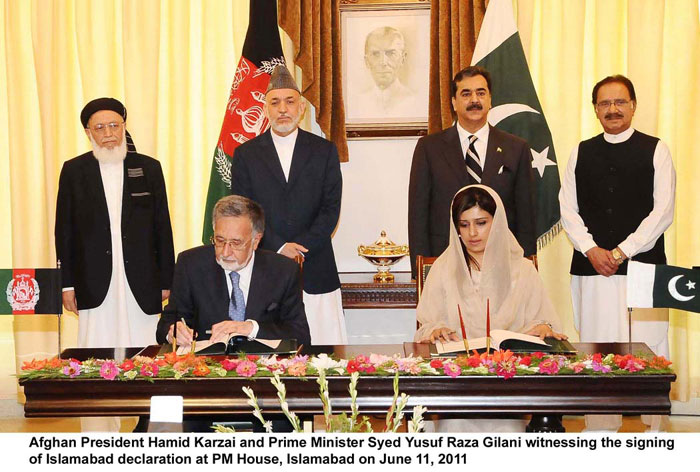Pakistan and Afghanistan sign Islamabad Declaration to promote development, prosperity and peace in
ISLAMABAD, Jun 11 (APP): Pakistan and Afghanistan on Saturday agreed for qualitative improvement in bilateral relations, promoting cooperation in trade, commerce, energy, connectivity, infrastructure development and people to people contacts besides reaffirming their resolve to work together to eliminate menace of terrorism and militancy. Both the countries signed 23 point “Islamabad Declaration” here at Prime Minister House following the bilateral meeting. Minister of State for Foreign Affairs Hina Rabbani Khar from Pakistan and Minister of Foreign Affairs of Afghanistan Dr. Zalmai Rassoul signed the declaration on behalf of their respective countries in the presence of Prime Minister Syed Yusuf Raza Gilani and Afghan President Hamid Karzai.
Both the countries agreed that the qualitative improvement in bilateral relations signified full trust and a mutual desire to take practical steps to promote expand and deepen economic and trade cooperation.
Through this “Islamabad Declaration” both the countries enhanced connectivity and infrastructure development; initiate cooperation in the sectors of energy, mines and minerals; and significantly enhance cultural, parliamentary, student, youth and people-to-people contacts.
The declaration was signed on the occasion of the visit of Afghan President Hamid Karzai to Pakistan on the invitation of President Asif Ali Zardari.
According to the details of the declaration issued by the Foreign Office the leadership of the two brotherly countries held in-depth talks, which were characterised by great warmth, on strengthening cooperation between Afghanistan and Pakistan in a comprehensive manner for realizing the shared vision of peace, development and prosperity for their respective peoples and for the region as a whole.
The leadership of Afghanistan and Pakistan expressed their satisfaction on the direction of the development of their bilateral cooperation.
In this regard, they recalled the Joint Declarations signed on 6 January 2009 and on 12 March 2010, which not only underscored the historical, cultural and religious bonds between the two countries but also their firm belief to open a new visionary chapter in their bilateral relations and to enhance mutual cooperation in all spheres as well as to jointly contribute to the promotion of regional cooperation for development and peace.
The leaders reaffirmed their resolve to work together for ensuring durable peace, security and stability and eliminating the menace of terrorism and militancy.
Both the countries expressed their satisfaction on the establishment of the 2-tier Joint Commission mechanism for facilitating and promoting reconciliation and peace in Afghanistan.
In this context, first meeting of the Commission was held here at the level of Heads of Government from the two countries.
Both sides expressed their satisfaction on the signing and ratification of the new Afghanistan-Pakistan Transit Trade Agreement (APTTA) and the successful finalization of the modalities and mechanism for its implementation.
They welcomed the operationalization of APTTA on 12 June 2011 and agreed to continue to take all necessary steps to ensure that this Agreement is fully implemented and that it contributes to the growth of trade, which has already witnessed a significant increase over the recent years.
Both sides agreed to initiate consultations with other interested states to establish trade transit and facilitation mechanisms/arrangements, which would enable their Central Asian neighbours to use overland routes through Afghanistan and Pakistan to the world.
Both sides also agreed to promote cooperation in the financial and banking sectors and, in particular, initiate consultations for the establishment of a Joint Investment Company for undertaking joint development projects in both countries.Pakistan and Afghanistan also agreed to take steps for establishing Special Economic and Industrial Zones, and to work together for the speedy realization of the Reconstruction Opportunity Zones, including securing greater market access. In this context, they underscored the importance of trade to strengthen and optimally utilize their respective and collective economic potential.
The natural economic complementarity of both countries and of the region holds enormous prospects of mutually-beneficial and harmonious economic growth.
They also called upon their friends and partners and on the international community, as a whole to assist and support development and economic opportunities by providing immediate preferential market access to Afghanistan and Pakistan.
It was agreed to work towards developing a framework of cooperation on infrastructure development. In this context, both sides emphasised the importance of enhancing connectivity and upgrading rail and road infrastructure.
It was noted that the Torkham-Jalalabad Expressway was nearing completion and agreed that necessary steps will be taken to jointly expand this Expressway to Herat through central Afghanistan.
It was agreed that steps will be initiated to establish a rail link between Peshawar and Jalalabad, which should then connect to Afghanistan’s north-south and east-west rail network.
Both sides expressed satisfaction on the development of aviation links and decided to increase the frequency and scope of these links.
Both sides welcomed the participation of the international community, in particular of the corporate sector, for working the economic agenda; establishment of project consortiums, on commercially-feasible projects in the fields of energy, transport, agriculture, mines & minerals and in other sectors.
It was agreed that the corporate sector must be the driver for economic growth and development. It would be appropriate for the international community, especially friends and partners, to encourage their corporate sector and provide incentives for its participation in profitable joint ventures with Afghanistan and Pakistan.
Both sides attached considerable importance to the early finalization of the process for establishment of the Turkmenistan-Afghanistan-Pakistan-India (TAPI) gas pipeline project, and to the speedy implementation of the CASA-1000 power transmission line.
Both sides agreed to commence consultations for developing a framework for cooperation in hydro-electric power generation and transmission projects for mutual benefit.
In this context, framework agreements for cooperation will be developed between Afghanistan and Pakistan.
Both sides agreed to form a Joint Commission with appropriate representation to address the prisoners’ issue.
Pakistan and Afghanistan expressed satisfaction on the implementation of the 2,000 scholarships scheme offered by Pakistan for Afghan students, out of which 900 Afghan students have already availed themselves of the facilities in education in specialized disciplines such as medicine and engineering.
The Afghan side expressed gratitude to Pakistan for this generous contribution, particularly for including the disciplines of medicine and engineering in the scholarship scheme.
Both sides agreed to consult on abolition of visas for holders of diplomatic passports.
To promote bilateral trade and investment, both sides also agreed to issue multiple visit visas of one year duration to traders and investors.
Pakistan and Afghanistan agreed to start regular youth exchange programmes whereby youth from both countries would undertake visits.
Similar exchange programmes will be established for women, media and both sides will enhance sporting contacts and cultural exchanges.
Both sides also agreed to develop cooperation in the fields of health and health sciences, including the establishment of 50 basic health units in Afghanistan by Pakistan; visits by specialists from both sides to each other’s premier medical universities and hospitals; setting up of health camps; and treatment facilities for Afghans in Pakistani hospitals as well as enrolment of Afghan students, especially girls, in Pakistan’s medical colleges and para-medical training institutions.
Both sides agreed to consult and cooperate on counter-narcotics.
They also emphasised on the importance of regional economic cooperation, and agreed to work together on bilateral and multilateral basis towards greater regional economic cooperation and economic integration, including through the various regional organisations of which they are members Pakistan and Afghanistan agreed to further enhance the process of consultations, cooperation and coordination for promoting stability, peace and development in the region.
In this context, they emphasized the importance of the Core Group process, including the meetings of the Core Group in Islamabad on 3 May and in Kabul on 24 May 2011.
Both sides reiterated their belief that, given their glorious traditions, cultural and civilizational heritage, the proud people of Afghanistan and Pakistan are amply equipped to overcome all pressing challenges and are determined to seize new opportunities for a brighter future for themselves and for the region as a whole.



 12-06-2011 11:23:14
|


